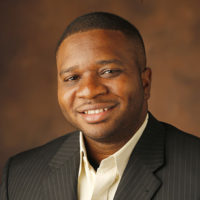Three faculty members from the School of Engineering are recipients of the National Science Foundation Early CAREER Award. The Faculty Early Career Development (CAREER) Program offers the most prestigious awards in support of early-career faculty who have the potential to serve as academic role models in research and education and to lead advances in the mission of their department or organization.
“I’m thrilled our young faculty members have won prestigious CAREER awards to help develop their careers. We saw, as has the NSF, their potential to become leading engineering researchers and collaborators as we continue our strong tradition of winning these awards,” said Philippe Fauchet, Bruce and Bridgitt Evans Dean of Engineering. “It is a testimony to the quality of our young faculty members, and as a school, we look forward to supporting them.”

David Braun
David Braun, assistant professor of mechanical engineering, is conducting foundational research in mechanically adaptive robotics. His CAREER project, “Mechanically Adaptive, Energetically Passive Robotics,” will enable the creation of new-generation industrial robots, transportation systems and devices that can assist and augment humans.
The five-year, $600,000 grant will support work on robot exoskeletons that go beyond current passive devices by integrating actively controlled energy storage. The results could enable levels of human mobility enhancement unprecedented in unpowered devices. The results also will lead to increased energy efficiency in mobile robotic systems for extended missions and improved autonomy.
Braun uses techniques from the fields of optimal control, nonlinear dynamics and computational design to develop robots that can augment human physical ability and parallel human decision-making capability. His prior research on optimal control of compliant robots was acknowledged with the 2014 IEEE Transactions on Robotics King-Sun Fu Award as the best paper annually published in one of the most prestigious journals in robotics.
Braun has been a postdoctoral research fellow in the School of Informatics at the University of Edinburgh and a visiting researcher at the Institute for Robotics and Mechatronics at the German Aerospace Center.
Before joining the Vanderbilt engineering faculty, Braun was an assistant professor at Singapore University of Technology and Design. He earned bachelor’s and master’s degrees from the University of Novi Sad, Serbia, and a doctorate in mechanical engineering from Vanderbilt.

Justus C. Ndukaife
Justus C. Ndukaife, assistant professor of electrical engineering, was recognized for foundational research in cell-to-cell communication. His CAREER project, “Resonant Dielectric Optical Metasurfaces for Single-Cell Extracellular Vesicles Analysis,” will enable Ndukaife to associate the properties of extracellular vesicles directly to their cell sources—up to the resolution of single cells—a capability that has so far remained elusive.
The five-year, $508,000 grant will support the use of optical nanostructures to selectively capture EVs as they are released by a single cell without damage and analyze the single-cell secreted EVs to enable correlating the function of the EVs directly to their cells of origin. This will address a gap in knowledge that is key to enhancing the understanding of EVs and to better enable their applications in therapeutics and diagnostics.
The award also includes international education and outreach activities to young scholars in West Africa in collaboration with the University of Nigeria, as well as outreach activities in Nashville.
His work on single-molecule trapping using opto-thermo-electrohydrodynamic tweezers was featured in an article that appeared in Nature Nanotechnology in 2020. Optical tweezers use a tightly focused laser beam to trap particles and have emerged as a powerful tool in biological research providing the means to non-invasively manipulate microscopic objects such as biological cells. This work led to a Chancellor’s Award for Research in 2021.
Ndukaife also was selected as a global Rising Star of Light by the Nature family journal Light Science and Applications and was invited to present this research paper at the global iCANx talks. His presentation on optical nanotweezers was viewed by more than 260,000 researchers worldwide, which brought enhanced visibility to his research work and to Vanderbilt.
Ndukaife joined the Vanderbilt engineering faculty in 2017. He received a Ph.D. in electrical engineering from Purdue University in 2017.

Ahmad F. Taha
Ahmad F. Taha, associate professor of civil and environmental engineering, is developing new approaches to network sensors and controllers scheduling. His CAREER project, “Scheduling Driving Sensing and Control Nodes in Nonlinear Networks with Applications to Fuel-Free Energy Systems,” offers a novel framework for the exploration of sensor and controller scheduling problems.
Power and water systems, the internet, and other infrastructure are assembled into intertwined networks. These systems form nonlinear networks that rely on ubiquitous sensors and controllers. Examples include water flow meters and pumps in water systems, ramp meters and cameras on highways, and solar panels and smart meters in energy networks. As a result, the scheduling of sensors and controllers embodies a major step in the reliable operation of various systems and urban infrastructure.
The five-year, $526,527 grant will support work to generate subsets of driving control/sensing nodes and will have major implications in identifying vulnerabilities and network failures. The project will apply the theoretical foundations in fuel-free power networks that are characterized by the intermittent nature of renewables and consumer behavior.
Taha’s research and teaching interests span dynamic systems sciences, control theory, optimization and cyber-security, with applications in energy, water and transportation systems. His recent research examines how complex and dynamic urban infrastructure operates, behaves and sometimes misbehaves.
Taha holds a Ph.D. in electrical and computer engineering from Purdue University and a B.E. from the American University of Beirut, Lebanon. Before joining the Vanderbilt engineering faculty in August 2021, he was an assistant professor in electrical and computer engineering at the University of Texas at San Antonio. Taha also has been a visiting researcher at Argonne National Laboratory, the University of Toronto and the Massachusetts Institute of Technology.
